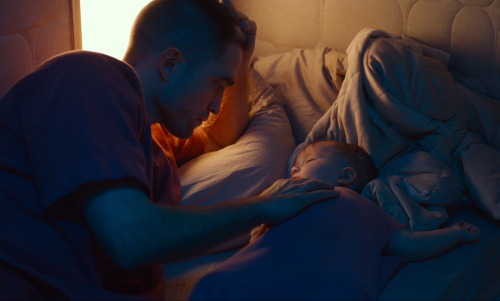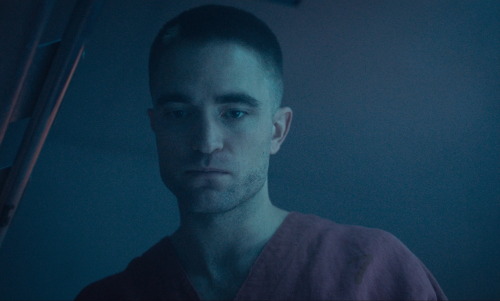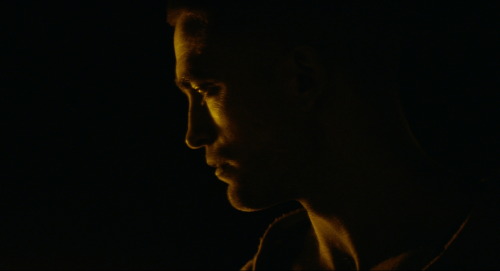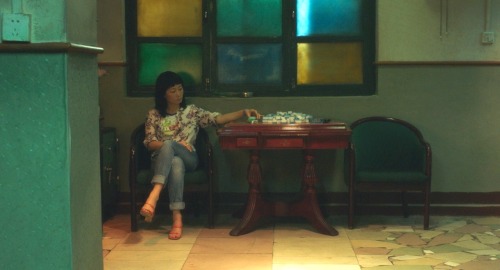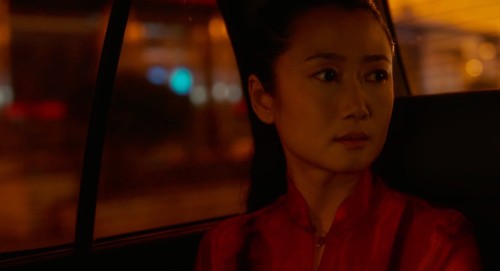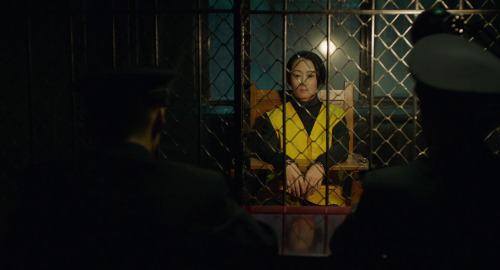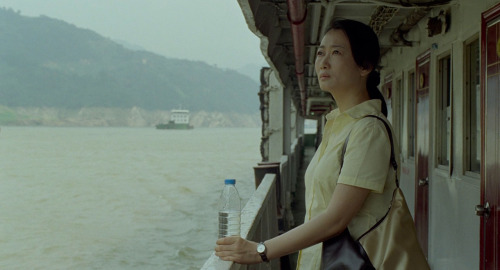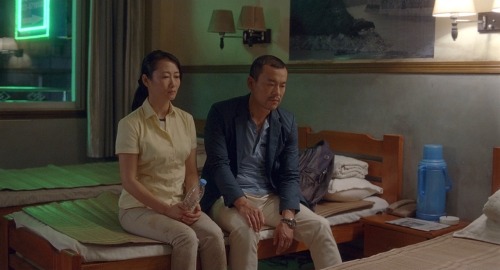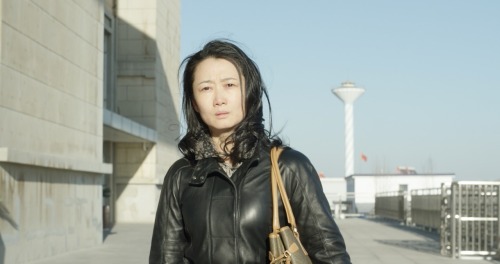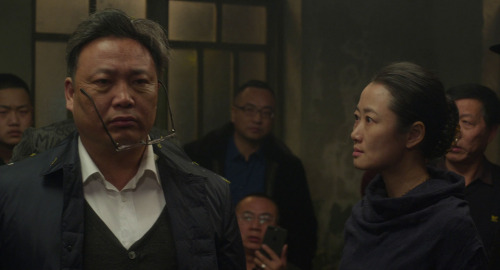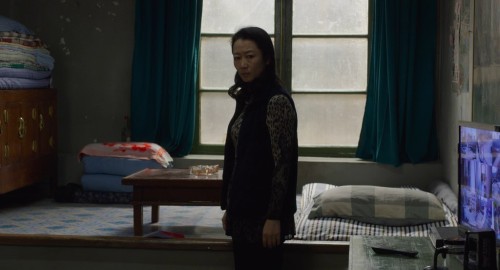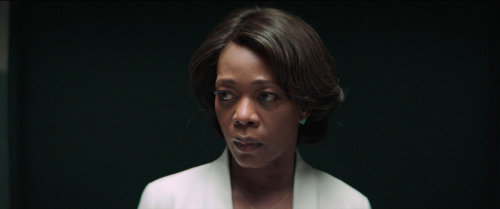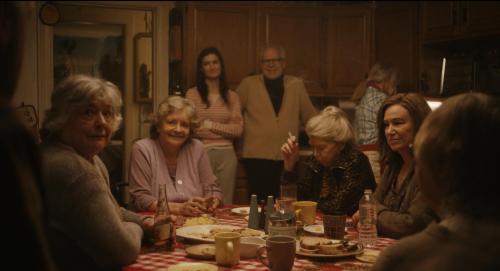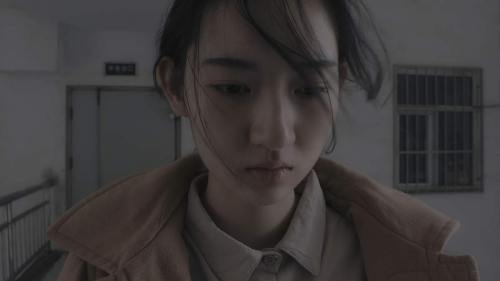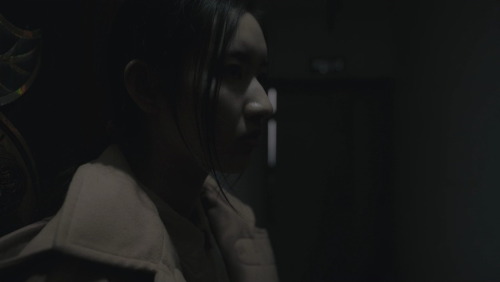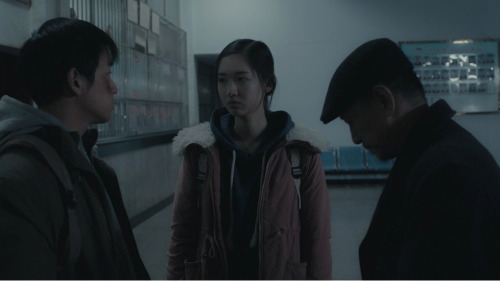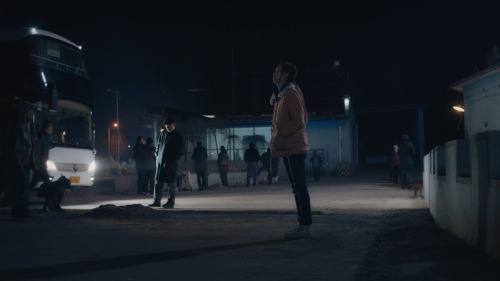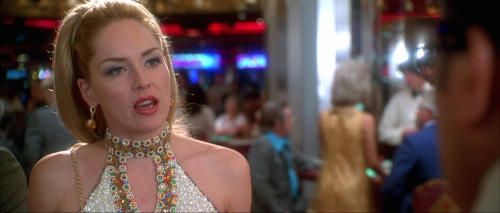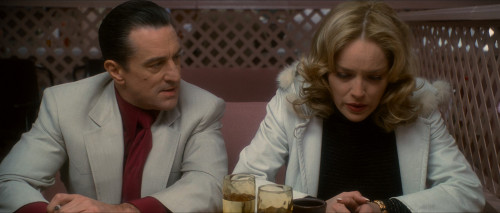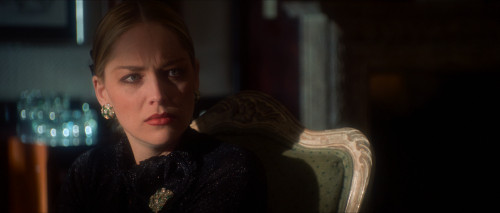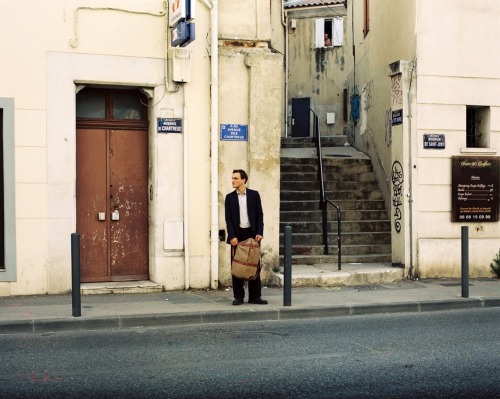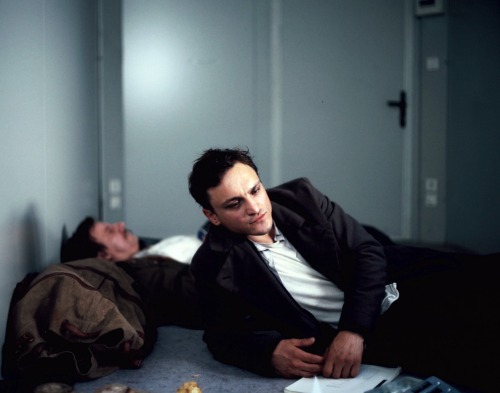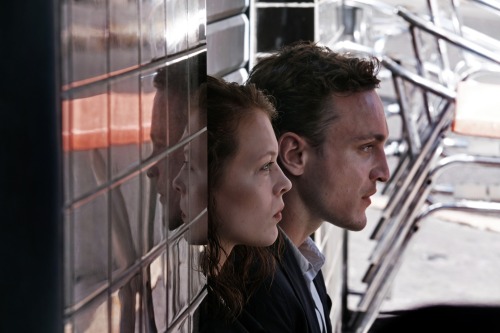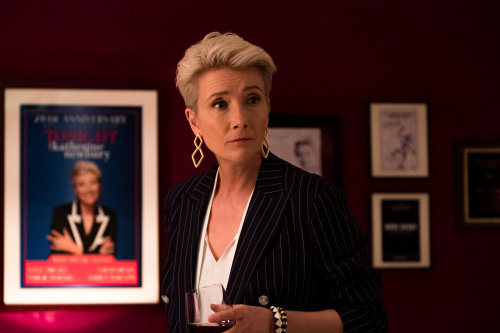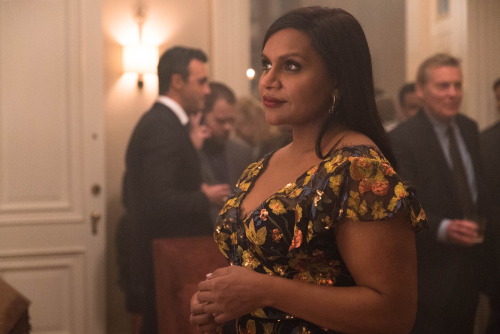#great performance
“Robert Pattinson’s unflagging dedication to his recent directors, from James Gray to Josh and Benny Safdie to Claire Denis, has resulted in some of the finest screen acting of the decade and performances that are something like acts of immersion. In Denis’ High Life, Pattinson’s physical beauty is an ideal object of scrutiny for a director long fascinated by the ways in which a cinematic body can reveal and refract a lived experience the cinematic possibilities of the human body. As Monty, one of a group of convicts shot into deep space for a doomed mission, Pattinson lends methodical concentration and welcome soulfulness to Denis’ virtuosic foray into the realm of science fiction. For all its shocks and provocations, nothing in High Life haunted me quite as profoundly as the wearied spirit beneath Pattinson’s hard body, a sadness that will not yet allow itself to surrender to death’s oblivion. Psychological portraiture is seldom the focus of Denis’ filmmaking, but Pattinson implies an intricate interior world inflected by the sordid desires and burning, sometimes brutal impulses that Monty refuses to give in to. Although Denis forbids us from seeing all the way inside the character, those intently concentrating on Pattinson are rewarded by his habit of lingering on certain moments, lengthening pauses and prolonging glances to encourage our own exploration into the psyche of this tortured but resolute man, a prisoner in more ways than one.” — Matthew Eng
The 12 Best Male Film Performances of Early 2019
(Source:TribecaFilm.com)
Post link
“In the films of her husband and ongoing collaborator Jia Zhangke, Zhao Tao has burrowed into each of her central roles with the prowess of a performer willing to discard any and all traces of herself in the name of her characters. She is that phenomenal being: an actor entirely without vanity. Her performances exist where Jia’s work exists—at the intersection of life and art, a place where the differences between reality and fiction cease to matter. In Ash Is Purest White, Zhao applies her extraordinary, unselfish talent to the transmogrifying arc of Qiao, a gangster’s moll forced to build her life anew after making the ultimate sacrifice for her inamorato. As she did in her previous film with Jia, Mountains May Depart, the actress ages decades across this personal epic, relying not so much on conspicuous cosmetic transformation or surface-bound tics to signal maturation but her unadorned face, which can express anything and everything; here, it manages to contain and communicate a lifetime of anguish and lasting passion. By stripping her style down to the wordless, elemental basics of screen acting, Zhao makes certain that the clarity of Qiao’s emotions and her durable connection to the audience are never diminished. In doing so, she continues to occupy her rightful place as the heart—and breath—of Jia’s lifelike cinema.” — Matthew Eng
The 12 Best Female Film Performances of Early 2019
(Source:TribecaFilm.com)
Post link
“There is not a film performance this year more technically virtuosic than Alfre Woodard’s awe-inspiring central turn as Bernadine, a hardened prison warden who has long repressed the psychic toll of executing over a dozen inmates throughout her career, in Chinonye Chukwu’s Clemency. Using little more than her body, the most expressive and effective weapon in her arsenal, Woodard draws a haunting portrait of a woman quietly reevaluating the sum total of her life’s work, weighing her professional standing with the deep-seated guilt that pours out like a burst dam during the film’s climax, which plays out entirely on Woodard’s tormented face. In an earlier shot, following a heated argument with the lawyer (Richard Schiff) of the latest prisoner (the remarkable Aldis Hodge) that Bernadine is scheduled to put to death, Woodard does nothing but constrict her throat and gulp with alarming severity. It’s a small, perfectly suppressed movement that exposes a fissure in this supposedly ironclad figure, a single trace of the abysmal vulnerability that Bernadine herself declines to acknowledge. If acting awards were actually handed out on merit alone, the Oscar would already be in Woodard’s hands.” — Matthew Eng
Memorable Moments from Great Performances of 2019
(Source:TribecaFilm.com)
Post link
“There is a unique and heartening thrill in watching an actor often shunted to the sidelines of films and TV shows finally obtain the spotlight she has been denied throughout her career. Such is the sensation of watching Mary Kay Place in Kent Jones’ Diane, a portrait of a worn out Massachusetts woman whose enduring sense of charity mirrors Place’s characteristic generosity as a performer who has tirelessly aided her fellow actors in countless projects, on the big screen and small, for over 40 years. Place’s Diane is the unwavering focus of the drama that bears her name, an emotional and psychological pilgrimage through the final winters of an aging, self-punishing caregiver prone to attending to everyone’s needs but her own. There is little flash to Place’s performance, which is consonant with Diane’s shrinking persona, the determined, tight-lipped, head-down reticence that only collapses when in the presence of her adult son (Jake Lacy), a hopeless addict whose irresponsibility enrages Diane to no end. Even when Diane reaches the end of her rope in these squabbles or in another quick-tempered quarrel with an insensitive volunteer at her local soup kitchen, Place never implores the audience for easy, uncomplicated sympathy; instead, she earns our rapt consideration by standing steadfast in the honesty of her minimalism, a mark of both her professionalism and her artistry. The actress is assured enough in her ability to touch upon a vast reserve of life experience to illuminate Diane’s inward struggle. She doesn’t strain for the teary, self-serving catharsis that would diminish the quiet desperation of the character’s circumstances, which Place seems to feel from the inside and exquisitely personifies with endless variations on exhaustion, agitation, and insuperable soul-sickness. By staying true to Diane, Place ensures that we are with the character every step of the way and gives depth to the type of woman who may move unknown through our daily lives but is far from unknowable.
Jones’ film makes room for plenty of splendid, underused veterans in addition to Place, among them Andrea Martin, Estelle Parsons, Phyllis Somerville, and, best of all, Deirdre O’Connell, a superb actor of stage and screen who usually resides even further on the margins of her projects than Place does in hers. O’Connell, a ringer who has been called upon many times to complement thankless parts, absolutely nails her small but significant role as Donna, Diane’s dying cousin, who has forgiven but not forgotten a betrayal in their shared past and refuses to flatter Diane in her final days. Delivering her entire performance from a hospital sickbed, O’Connell conveys tough wisdom with an authoritative whisper and the uncanny ease of someone made acutely aware that time is no longer on her side. When the character slips away, O’Connell’s powerful, straight-talking integrity, a force that supersedes her mortal frailty, weighs heavily over the film that follows, a phantom presence impossible to leave behind. In just a few scenes, the actress imparts the unmistakable and unfading impression of a life actually lived and lost.” —Matthew Eng
The 12 Best Female Film Performances of Early 2019
(Source:TribecaFilm.com)
Post link
“Bong Joon-ho’s knives are unquestionably out for the prosperous and prepossessing family of one-percenters who become the unwitting dupes of a lower-class family’s cunning machinations in Parasite. But Cho Yeo-jeong triggers something other than disdain. As matriarch Yeon-gyo, the actress eliminates all irony and self-awareness from her performance, instead walking around in a lulling fog of blithe, dimwitted amiability, the personification of Bong’s idea that kindness is one of the only luxuries that the rich deign to share with those below them. Yeo-jeong is not playing a broad caricature of affluent vapidity but actual vapidity. Her character is a flibbertigibbet who has submerged any sense of an ego beneath the immediate concerns of home and family; there doesn’t seem to be an intimidating or interrogative bone in her body. Yeon-gyo’s inquiring, open-mouthed mien and artless, often idiotic inquiries in her scenes with the Kim family are never less than amusing, but they’re also unexpectedly pitiful because Yeo-jeong renders them with such peculiar wholeheartedness. By personating her character as someone fundamentally impaired by her social rank, the actress guarantees our critical sympathy, rather than our ridicule, and makes this class-conscious satire so much richer for recognizing the mortal insecurities of its well heeled targets.” — Matthew Eng
Memorable Moments from Great Performances of 2019
(Source:TribecaFilm.com)
Post link
“Adolescent screen turns tend to be praised for their precocious hyper-expressivity or youthful dynamism, but Wang Yuwen does something different in An Elephant Sitting Still. In the late Hu Bo’s mammoth undertaking, a darkly poetic and nearly four-hour drama about discontented residents of contemporary China, Wang’s performance is defined by a deadpan, glassy-eyed grimace that covers the actress’ face throughout the majority of her scenes. Wang’s bracing simplicity as Huang Ling, a willfully disobedient schoolgirl, helps ground some of the more sensational elements of Hu’s conception of the character—her binge-drinking mother, her illicit affair with a married high school dean—within the realm of lived experience, as felt but not always as communicated by this recessive personality. An air of forbidding detachment clings to the actress, even when Huang is voraciously gobbling up pastries or a pitifully squashed birthday cake. By refusing to react, Wang cannily plays against the expectations of her character’s arc while providing a running commentary on a particular kind of teenage experience. Maybe one day, Huang will look back on the events portrayed herein with different, more palpable feelings, but for now she can only drift through the motions of an abysmal life she loathes. Blankness is often deemed a demerit in acting, a presumed indication of a performer’s vacuity, yet Wang’s blankness reveals not the absence of thought, but its painful concealment: in a world of so much sadness, what more can the young and isolated do but suppress and subsist? When Huang eventually lashes out at those who have failed to protect her after hours of grim impassivity, it begets a moment of volcanic release that the actress has earned by closely adhering to the state of silent despair that can so easily oppress those unready to fight it.” — Matthew Eng
The 12 Best Female Film Performances of Early 2019
(Source:TribecaFilm.com)
Post link
Happy birthday, Sharon Stone!
“Nothing and nobody else matters in Martin Scorsese’s Casino whenever Sharon Stone’s decadent and devastating Ginger McKenna slinks into a frame. Playing a bona fide hustler unhappily betrothed to De Niro’s smitten casino honcho, Stone is the single most striking element in Scorsese’s fact-based Las Vegas crime saga. The actress can take our breath away just by strolling into a room in a beautifully beaded Bob Mackie gown, but she’s also playing a real, anguishing woman to never less than riveting effect. Stone’s voluptuous emotional shadings make us believe every stage of Ginger’s ever-shifting character, whether it be the scam artist with a criminal knowledge to rival any man’s, the codependent lover, the keyed-up addict, or the materialistic housewife itching to get out of her lavish prison at any cost, even if it means offing her husband/jailor with the help of his equally infatuated best friend. Stone never sands down Ginger’s rough edges and her strident, exceptionally physical blow-ups in the film’s final act conjure an intricate and unabating intensity that some critics like to pretend is the exclusive provenance of men in Scorsese’s movies; they’re wrong, and Stone’s superb and rightfully iconic performance is the enduring proof.” — Matthew Eng
The 10 Best Female Film Performances in Martin Scorsese Films
(Source:TribecaFilm.com)
Post link
“Franz Rogowski drifts into Christian Petzold’s Transit like the ghost of a man. As Georg, a desperate refugee posing as a writer to gain Mexican asylum and escape an occupied and increasingly hellish Europe, Rogowski first appears visibly emptied of feeling. Georg is a scarred witness to the atrocities of life during wartime, an enigma defined only by a drive to survive. His clammy body is shifty in its motions, as though not wishing to be noticed; his eyes are vacant, save for the troubled look that emanates in an early, pivotal moment of fight-or-flight calculation. Rogowski serves as the steady center of Petzold’s dystopian drama, and his revelatory performance is a carefully calibrated crescendo in which this blank canvas accrues new marks of affection, wistfulness, and guilt, becoming an ever more layered creation in the process. The actor has been endowed with an unconventionally beautiful face as distinctive and demonstrative as Al Pacino’s, but one that can be easily restricted of its full expressive power depending on who is standing behind the camera. We have seen the brooding hardness in Rogowski’s features before, but Petzold is one of the first directors to showcase its kindness, pleasing not in spite of its bruises but because of them. Petzold’s camera basks in the softness of Rogowski’s emoting visage as Georg lies in the arms of a newfound love or loses himself in the recital of a remembered lullaby from his youth, our dawning recognition of the actor’s capabilities paralleled by our gradual understanding of the character as Georg emerges from his self-preserving state of detachment. It is only fitting that Petzold ends his film with a devastating close-up of Rogowski lit from within by a foolish and impossible hope, his face a worn map eager to be discovered and read by an audience already attuned to its every microscopic movement.” — Matthew Eng
The 12 Best Male Film Performances of Early 2019
(Source:TribecaFilm.com)
Post link
“If an older, mellower Karen Carpenter were to transmit us a tune from an FM station located a galaxy light years away, she might sound a whole lot like Weyes Blood, née Natalie Mering. The ten tracks on Titanic Rising, the singer-songwriter’s intoxicating fourth album, feel like otherworldly daydreams unfolding in slo-mo, but Mering’s distinct voice is a fount of earthly tenderness that heightens the urgency of her songs’ lovelorn strains. On “Andromeda,” a plaintive plea for connection despite the distractions of our modern age, Mering evinces the same clarion smoothness and sentimental propensities as the late Carpenter, who was adored and reviled by a public at a time when her wholesome style of soft-rock, pure in voice and heart, was gradually on its way out. But there is—and has always been—profound value in Carpenter’s music, and her legacy is alive and well in the heartening work of descendants like Mering. In the final chorus of “Andromeda,” Mering draws out the lines, “Love is calling / It’s time to give to you / Something you can hold onto / I dare you to try,” with such honeyed tones that each note brings to light a new layer of pining; it is a prime example of how the emotive power of a talented vocalist can inflame the significance in seemingly simple lyrics. Mering’s rapturous delivery identifies love as both a concept for better, more fulfilling living and a warm and welcoming body that resides beside one’s own. Beneath the silvery surface of Mering’s lush alto and the earnest ruminations it communicates lie unfulfilled dreams as vital as those once sung about by Carpenter, a craving for closeness that can only be felt by those who are ready to listen.” — Matthew Eng
Memorable Moments from Great Performances of 2019
(Source:TribecaFilm.com)
Post link
“Even when her characters stand at life-altering crossroads, Emma Thompson always radiates the cool confidence of a certified genius who possesses an unshakable belief in herself and her gifts. We may sometimes doubt the sustainability of the women she plays, but we never doubt Thompson’s ability to imbue their experiences with humor, grace, and profundity. Late Night’s Katherine Newbury, a venerated comedian facing the loss of the talk show that is her lifeblood, is a role tailor-made for the sharp-witted comedic gifts that Thompson is seldom invited to utilize in her latter-day career, save for the occasional awards show presentation. Her sardonic one-liners consistently kill, but Thompson also knows that a withering, well-timed look or a purposeful pause can speak equal volumes. Yet what really distinguishes Thompson’s performance is the prickly, supercilious air that enshrouds Katherine, a byproduct of the actress’ welcome disinterest in making the character palatable or easy to root for; Thompson is too honest an interpreter to sand down the off-putting edges of this deeply flawed woman or simply heroize her last stand against the turning tides of network television. That we root for Katherine nevertheless is a natural inevitability when casting Thompson, who guarantees that Katherine’s moments of pathos, vindication, and victory will be earned and balanced out by the plausible, warts-and-all multidimensionality that is this sublime artist’s stock-in-trade.
Late Night is very much Thompson’s show, but it’s also a reminder that screenwriter and costar Mindy Kaling shines brightest when writing to her strengths, one of which is endowing often naïve, sometimes corny, and permanently genuine underdogs with worth and vitality on the page and screen. As Molly, the tokenized and exceedingly green new addition to Katherine’s all-male writers’ room, Kaling delights by leaning in to the character’s earnestness with the unabashed exuberance of a comedian who is accustomed to, say, looking like a fool or extending an awkward moment a beat or two past the normal threshold of comfort. It would be easy to play a character this painfully sincere with winking, in-on-the-joke irony—in other words, to emphasize the lie of one’s own performance. Kaling excels by doing the opposite, committing so hard to Molly’s verbal and physical faux pas that we are not only amused by the character’s wide-eyed gaucheness but duly convinced of it. Yet Kaling also knows that sweetness need never be confused for simplicity, and she emerges as a terrific proponent for this would-be heroine, giving Molly the cleverness and dignity to make us believe she could lift the dinosaur that is Katherine’s show out of a creative rut. By film’s end, Molly has proven that her ideas, smarts, and “lack of boundaries” are imperative, and her creator has persuaded us that her performative wit and pluck are qualities which the floundering American comedy should continue to harness. Kaling’s performance, like Thompson’s, suggests the tougher, more pointed, less polite satire Late Night might have been, but watching this unexpected yet inspired pair play off one another is never less than a spikily satisfying diversion.” — Matthew Eng
The 12 Best Female Film Performances of Early 2019
(Source:TribecaFilm.com)
Post link


